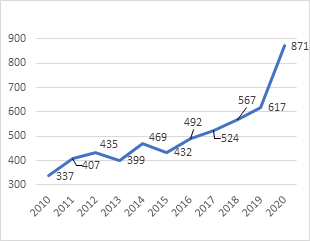A new paper published ONLINE FIRST freely accessible in the Journal of Population Economics finds that immigration from low-income countries reduces intergenerational mobility and thus steepens the social gradient in natives’ labor market outcomes, whereas immigration from high-income countries levels it.
Immigration and economic mobility
by Maria F. Hoen, Simen Markussen and Knut Røed
Published ONLINE FIRST 2021: Journal of Population Economics

Author Abstract: We examine how immigration affects natives’ relative prime-age labor market outcomes by economic class background, with class background established on the basis of parents’ earnings rank. Exploiting alternative sources of variation in immigration patterns across time and space, we find that immigration from low-income countries reduces intergenerational mobility and thus steepens the social gradient in natives’ labor market outcomes, whereas immigration from high-income countries levels it. These findings are robust with respect to a wide range of identifying assumptions. The analysis is based on high-quality population-wide administrative data from Norway, which is one of the rich-world countries with the most rapid rise in the immigrant population share over the past two decades. Our findings suggest that immigration can explain a considerable part of the observed relative decline in economic performance among natives with a lower-class background.

EiC Report 2020
SSCI IMPACT FACTOR 2.813 (2020) from 1.840 (2019) & 1.253 (2018)
SSCI 5-Year Impact Factor 3.318 (2020) from 2.353 (2019) & 2.072 (2018)
Journal of Population Economics
Access to the recently published Volume 34, Issue 3, July 2021.
LEAD ARTICLE OF ISSUE 3, 2021:
The safest time to fly: pandemic response in the era of Fox News
by Maxim Ananyev, Michael Poyker and Yuan Tian
OPEN ACCESS: Free Readlink – Download PDF
The Global Labor Organization (GLO) is an independent, non-partisan and non-governmental organization that functions as an international network and virtual platform to stimulate global research, debate and collaboration.
Ends;








